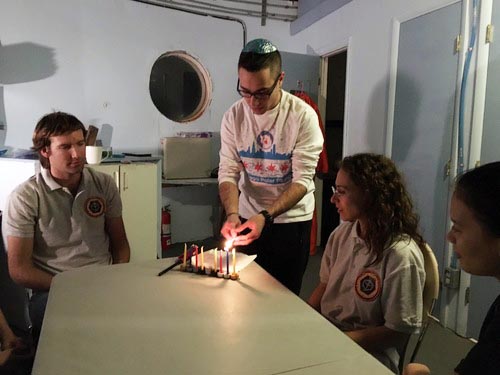
By Paul Wieder/JNS.org
CHICAGO (JNS) Yes, he has seen the recent film The Martian. But unlike the other millions who have seen that movie, Barak Stoltz went much closer to Mars.
Stoltz spent Hanukkah in the Utah desert, in a few cramped capsules that make up the Mars Desert Research Station (MDRS). He lit his menorah, sang some songs, and even tried his hand at making latkes—all while practicing for a manned mission to Mars.
MDRS is run by the Mars Society, a Colorado-based non-profit that works toward a human presence on that planet. The idea of the MDRS is to recreate, as much as possible, the living and working conditions that astronauts might face once they start to live in Mars. Through these practice runs, the Society hopes to refine the equipment, experiments, and practices necessary for a successful Mars mission.
Even more impressive, Stotlz is one of the youngest ever to participate in the MDRS in its 12 years. While his fellow “astronauts” were professionals, professors, and grad students, Stoltz himself is still a college junior. He is studying mechanical engineering and physics at the University of Illinois at Chicago. His title in the MDRS was Crew Astroengineer.
The five MDRS participants spent two weeks in December in the living pods, the lab, the greenhouse, and the observatory, wearing space suits when they venture outside. Stoltz’s assignment was in the observatory, which was donated by Elon Musk, “getting the telescope up and running, testing its remote control…making sure that the telescope is fully functional upon future crew arrival while exploring the beauty of space in the process.”
MDRS participants hail from around the United States, Europe, Latin America, and Asia. In addition to scientists, the MDRS has also housed everyone from experts in extreme wilderness survival to psychologists testing the mental effects of Martian living.
“As both a Jew and an Israeli I plan on sharing some of my culture and beliefs with the rest of the crew, giving them a glimpse into our culture,” Stoltz says. “For me, one of the incredible things about my MDRS crew is the sheer diversity. From Australia to Italy and back, we bring a variety of cultures and experiences into one place and get the opportunity to work with each other; and being the only Israeli on the team I will attempt to answer any question they have about our people to the best of my abilities.”
Barak was born in Israel, like his mother, and he spent his early childhood there. In 2007, the Stoltzes moved to Chicago, and Barak attended Solomon Schechter Day School in Northbrook, Ill., and Glenbrook North High School. In college, he says, “I am currently working doing research in a nanotechnology laboratory…on various nano-scale fibers which have some incredible conceptual applications.”
Ultimately, he’d like to actually go to Mars. “A successful manned mission to Mars would be one of the biggest accomplishments in human history, and being a part of it would be an absolute pleasure. It is time we push for a goal that is greater than ourselves and explore a little deeper into our universal neighborhood—what better place than our red neighbor?” he says.
His dad, Michael, is on the team, too. “I’m actually affiliated with the group, serving as its volunteer media coordinator,” Michael says. He met Barak’s mother in Israel; they lived there for 14 years, during which time he worked in public relations for Israeli Prime Minister Benjamin Netanyahu, as he transitioned from the Knesset to the Prime Minister’s office. The Stoltzes still visit Israel every summer.
As Barak elaborates, “For the longest time I had heard my father talk about MDRS due to his position as the director of media and public relations for the Mars Society. In my sophomore year, my father mentioned to me that one of the upcoming crews was short one member, so I applied. About a month later, I was officially a part of crew 159.”
Overall, Stoltz was “not nervous at all, more like excited! MDRS is such a unique…incredible learning opportunity both from an academic prospective as well as hands-on experience. As an enthusiastic believer in the future of space travel, I believe that our mind should wonder at the thought of space exploration, and what better way to do so than in the middle of the Utah desert with a sky full of stars.”
Paul Wieder is associate editor of Chicago’s JUF News, where this article first appeared.